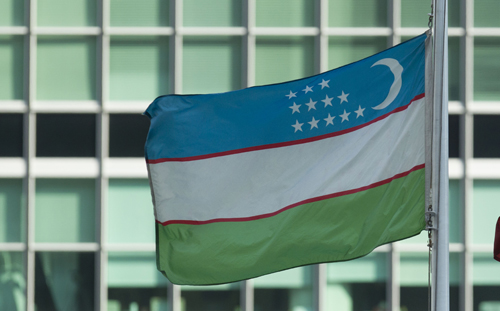STEFAN J BOS, of BosNewsLife, reports on the uncertain situation facing Christians in Uzbekistan following the death of President Karimov…

More than 210,000 Christians in Uzbekistan face uncertainty after the nation’s parliament appointed Prime Minister Shavkat Mirziyaev as interim president following the death of strongman leader Islam Karimov, missionaries told BosNewsLife.
Mission Eurasia said that many Christians and pastors believe that the situation for believers in Uzbekistan will only grow worse in the coming months under the former Prime Minister.

Flag of Uzbekistan. PICTURE: UN Photo/Loey Felipe
“We know that there are thousands of believers and pastors who are risking everything – jobs, families, even their lives – to live as Christians and preach the Gospel in Uzbekistan.”
– Mission Eurasia
Mr Mirziyaev, 58, is a close Karimov ally. He served as prime minister since 2003, holding the post longer than anyone else in the 25 years since Uzbekistan gained independence in the Soviet Union’s breakup in 1991.
Christians suggested that Mr Mirziyaev is likely to continue or even expand controversial policies of Mr Karimov, who Mission Eurasia said was known for his “authoritarian style of rule and the draconian methods he used to restrict civil liberties and religious freedom”.
Under Mr Karimov, media censorship and restrictions on free speech “were among the most extreme in the world,” the group added.
Rights activists also recall him as a ruthless leader known for cracking down on dissent and independent media. His troops reportedly killed hundreds unarmed demonstrators with machine guns during a 2005 uprising. Mr Karimov also jailed thousands of political opponents, and his henchmen reportedly boiled some dissidents to death.
The World Watch List, which reports on Christian persecution around the world, ranks Uzbekistan as one of the top 15 worst countries in the world for devoted Christians.
“Currently, it is illegal in Uzbekistan to conduct evangelistic activity or attempt to attract believers of one faith to another,” explained Mission Eurasia, one of the most active mission groups in the region.
Missionaries said that the “current power vacuum” could also strengthen the control of the country’s feared national security service (SNB), which was created as a successor to the KGB following the collapse of the Soviet Union. Christians say it has “a long history of torture, censorship, and human rights abuses”, including raids of churches and Christian homes.
Among those targeted was David Shestakov, an Uzbek evangelical pastor and his family, who arrived in the United States after a nine-year ordeal of what his supporters called “persecution and exile for their faith.”
Mission Eurasia had been advocating on behalf of Pastor Shestakov and his family, who reportedly fled to Ukraine from Uzbekistan in 2013, and were finally granted entry into the United States on 30th August, 2016.
“We praise God that the Shestakovs made it to the United States safely, but we also continue to pray for the many Christians who are still suffering for their faith in Uzbekistan,” Mission Eurasia told BosNewsLife.
“We know that there are thousands of believers and pastors who are risking everything – jobs, families, even their lives – to live as Christians and preach the Gospel in Uzbekistan.”
The group said it is concerned that “in the midst of this tumult and uncertainty” the situation for Christians and churches in Uzbekistan will only grow worse. Christians also suffer as the predominantly Sunni Muslim country could face prolonged infighting among clans over its eventual leadership. Analysts have warned that the Islamic Movement of Uzbekistan could exploit the uncertainty.
Over the years, the group has been affiliated with the Taliban, al-Qaeda and the so-called Islamic State group, and it has sent fighters abroad.
Mr Mirziyaev’s appointment as interim leader of the former Soviet republic veered away from the system laid out in the central Asian state’s constitution.
It says that the chairman of the upper parliament chamber, the Senate, assumes presidential authority for three months if the president dies or is unable to perform his or her duties.
Yet, Senate chairman Nigmatulla Yuldashev asked lawmakers to appoint Mr Mirziyaev instead, citing “his many years of experience,” and lawmakers supported the proposal, according to a government statement.
Mr Karimov, who died following a stroke at the age of 78, was buried in his birthplace of Samarkand on 3rd September. Funeral rites were performed in Registan Square in the ancient Silk Road city by a mufti who said that “Islam Karimov served his people.”
Mr Karimov became leader of Uzbekistan in 1989 when it was a Soviet republic, then held power throughout all of Uzbekistan independence.
However he cultivated no apparent successor, which has contributed to an expected period of uncertainty.





